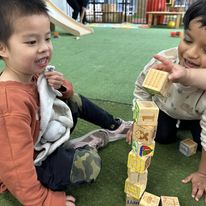Toys play a significant role in any child's development, as they offer numerous benefits that contribute to physical, cognitive, social, and emotional growth. Here's an overview of the importance of toys for child development:
Cognitive Development:
Problem-Solving Skills: Toys like puzzles and building blocks challenge children to think critically and solve problems. These activities promote the development of logical thinking and reasoning skills.
Imagination and Creativity: Many toys encourage imaginative play, allowing children to create stories, scenarios, and use their creativity. Dolls, action figures, and pretend play items facilitate this type of development.
Physical Development:
Fine Motor Skills: Toys like building blocks, art supplies, and puzzles require fine motor skills, which involve the use of small muscles in the hands and fingers. Developing these skills is crucial for tasks like writing and buttoning clothes.
Gross Motor Skills: Physical toys like balls, bicycles, and outdoor play equipment help children develop gross motor skills, promoting balance, coordination, and physical strength.
Vocabulary Expansion: Books, educational games, and toys with labels or audio components introduce new words and concepts, supporting language development.
Social Interaction: Toys that encourage social play, like board games or role-playing items, enable children to communicate, share ideas, and practice social skills through dialogue and collaboration.
Expression of Emotions: Dolls, stuffed animals, and other soft toys can serve as outlets for children to express and manage their emotions. They may also use these toys to understand and relate to others.
Empathy and Compassion: Playing with toys that involve characters and stories can help children understand and relate to the feelings and experiences of others, promoting empathy and compassion.
Cooperation: Games and group activities teach children the importance of cooperation, taking turns, and respecting rules and boundaries.
Conflict Resolution: When children play together with toys, they may encounter conflicts. This provides an opportunity for them to learn conflict resolution skills and negotiation.
Sensory Exploration: Many toys offer sensory stimulation through colours, textures, sounds, and shapes. This exploration supports the development of sensory perception and awareness.
Pre-Math and Pre-Literacy Skills: Educational toys can introduce children to basic math and literacy concepts, such as counting, letter recognition, and early math operations.
Curiosity and Interest: Toys can spark a child's interest in various subjects, encouraging them to explore and learn more about the world around them.
Structured Play: Playing with toys often occurs within a specific time or routine, helping children learn about time management and following schedules.
Self-Directed Play: Toys that allow children to play independently can boost their confidence, sense of autonomy, and ability to entertain themselves.
Overall, toys serve as essential tools in a child's developmental journey. However, it's important for parents and caregivers to select age-appropriate toys, provide a variety of play experiences, and engage in playtime with their child ren to maximise the benefits and support their development effectively.
Selecting toys that are not only fun but also support a child's development can be a rewarding experience. Here are some effective and fun developmental toys that many of our centre children love:
Building Blocks: Building toys like LEGO sets, Mega Blocks, or wooden building blocks help develop fine motor skills, spatial awareness, and creativity.
Puzzles: Age-appropriate puzzles encourage problem-solving, hand-eye coordination, and cognitive skills. There are puzzles available for various age groups, from simple shape puzzles to more complex jigsaw puzzles.
Art Supplies: Crayons, coloured pencils, markers, and washable paints foster creativity and fine motor skills. Consider art kits with various mediums and craft supplies.
Board Games: Many board games teach social skills, critical thinking, and cooperation. Some popular options include "Candy Land," "Chutes and Ladders," "Connect 4," and "Uno."
Dress-Up Clothes: Costumes and dress-up clothes let children use their imaginations and explore different roles and characters.
Play-Doh and Clay: These mouldable materials are fantastic for sensory play and fine motor skill development. Children can create shapes, figures, and more.
Educational Apps and Games: There are many educational apps and video games that teach various subjects while engaging children in interactive learning. Popular options include "ABCmouse," "Osmo," and "Toca Boca."
Musical Instruments: Simple instruments like xylophones, keyboards, and shakers allow kids to explore music and rhythm, promoting auditory and sensory development.
Dolls and Action Figures: Dolls and action figures encourage imaginative play and can help children explore social and emotional concepts.
Books: Picture books, board books, and interactive books are great for language development and fostering a love of reading. Consider age-appropriate books with colourful illustrations.
Outdoor Toys: Items like bicycles, scooters, tricycles, and sports equipment encourage physical activity, balance, and coordination. Also, consider items like kites, sidewalk chalk, and jump ropes.
Science Kits: Age-appropriate science kits and experiments can be both fun and educational. They allow kids to explore the wonders of science and engage in hands-on learning.
Magnetic Building Sets: Magnetic tiles, like Magna-Tiles or Magformers, are fantastic for stimulating creativity and understanding basic concepts of magnetism and geometry.
Building and Engineering Kits: Toys like LEGO Technic sets, K'Nex, or robotics kits can help children explore engineering principles, problem-solving, and innovation.
Tea Sets and Kitchen Play: These toys encourage imaginative and social play, as children can emulate everyday activities and interact with friends and family.
Remote-Controlled Vehicles: Remote-controlled cars, drones, and helicopters can be a source of great fascination for kids while enhancing hand-eye coordination and problem-solving skills.
Bicycles and Tricycles: Riding a bicycle or tricycle promotes physical development and enhances gross motor skills. It's also a fun way to explore the outdoors.
Construction Sets: Toys like Tinkertoys, Lincoln Logs, and Erector Sets are excellent for fostering creativity and problem-solving through building and engineering.
Gardening Kits: Gardening kits for kids can introduce them to nature and science, teaching them about plant growth and the environment.


